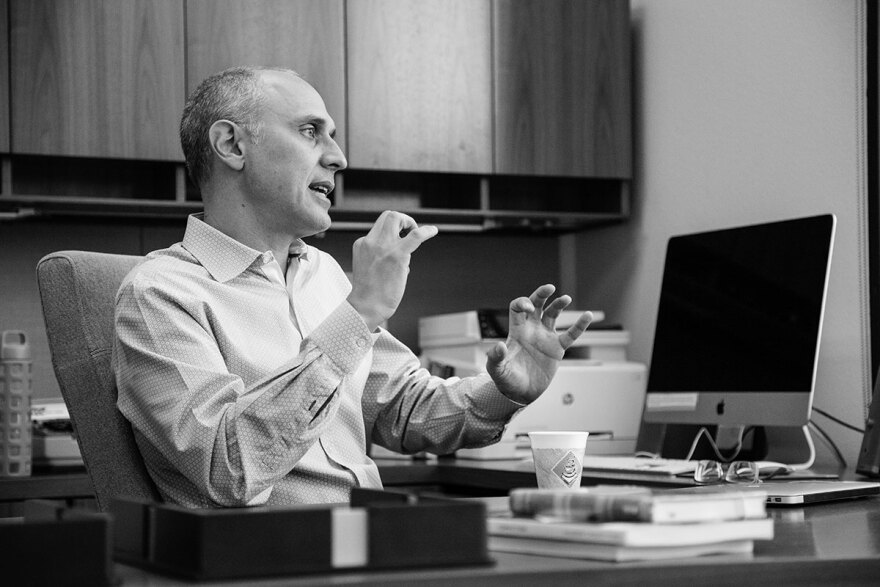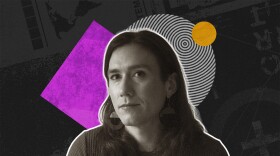New Black Mountain Institute Executive Director Joshua Wolf Shenk plots the future of the literary center
It can be challenging for newcomers to adjust to Las Vegas — our weather, our ways, our whole I-can-buy-shampoo-and-eat-a-steak at 3 a.m. lifestyle. But it might be especially challenging for Joshua Wolf Shenk. Shenk not only has to find a dentist and learn to negotiate the Spaghetti Bowl; he’s also charged with writing the next chapter of an international literary center based in a city known more for spectacle than scholarship. Shenk started in August as the new executive director of the Black Mountain Institute, which was largely built and grown under former executive director and UNLV President Emerita Carol Harter.
If this interview is any indication, the next chapter should be compelling. Shenk — founding adviser of The Moth storytelling program, author of numerous books and articles exploring creativity and mental health, and free-range literary impresario — aims to take BMI well beyond the walls of UNLV, in more ways than one.
You have a diverse resume — founding adviser of The Moth, author of books on everything from famous creative partnerships to Lincoln’s clinical depression, a teacher of nonfiction. How do you see your resume fueling future plans for BMI?
I’m situated as a mediator between two cultures, between the culture of literary writing, which has a home in the academy — a place where you can come, read seriously and write seriously and engage in this delicate and mysterious process that takes a lot of time and lot of quiet and a lot of support. At the same time, I’ve been able to mediate between that and a world of, for lack of a better phrase, entrepreneurial culture, a world that asks how is work brought to a general audience, what will excite attention in a meaningful way, a substantial way? Which sometimes mean paying attention to what excites attention in superficial ways — but only so you can grasp some of that energy and run a wire from that into things that are meaningful and ultimately helpful. What is a meaningful thing, and how do I bring it to an audience?
Another preoccupation of mine is institutional collaboration, something that I think BMI is really set up for for a few reasons. We have this record, and we have resources to get stuff started that we can then bring to the perfect partner and say, “Do you want to play with us on this?” And I think it fits with what Las Vegas is at its core, a meeting place, a gathering place, that place where people gather and encounter people different from them. I’m very interested in that, both as a physical fact — because you can fly here from anywhere, quickly, and we’re close to the world, we’re accessible, a crossroads and an intersection — and as a metaphor.
Do you have an example of a collaboration you’d like to pursue?
I have 100 ideas how that might manifest, and I’ll tell you one. Shortly after I got the job, I met with a series of people who seem like promising potential partners, and among them were the crew at McSweeney’s. We threw lots of ideas back and forth, and out of that grew the idea to create a live series of events in Las Vegas that will generate content for a special issue of The Believer. Conversations, commissioned pieces, performances, both to create material that will be text that will float directly into the pages of The Believer, some material that will require editing and sculpting, and some that will be audio for their podcast, which is a KCRW podcast called “The Organist.” The collaboration is this delightful thing where they get to do something different, they get to have this experience in Las Vegas, they get financial support to generate live programming they wouldn’t ordinarily be able to fund. We get access to their community, a mesh of their community and our community, and the whole thing also articulates something that’s really core to my philosophy about curating, which is that the ideal nexus is where you have a live experience where human beings get to be in a room together — something increasingly rare and something people are deeply, deeply hungry for — that offers a possibility for real transformation on top of education and entertainment, and to combine that with some substantial piece of media — be it a book, or a film, or in this case, a magazine, or a podcast — that allows that to live outside of that room and to be accessible to vastly greater numbers of people, people who are not privileged to join that small gathering. Whether it’s 20 or several thousand people, it’s small compared to what a magazine might reach. The largest Moth shows have done halls that are, like, 3,500 people, but there are a million downloads of the podcast every week. But both audiences are experiencing something that feels like it’s for them.
Is there a theme for this project?
We’re working on a theme. We want to do something that is evocative of the particular landscape of Las Vegas and its environment, but that also rises up as a metaphor. This something I and the BMI staff and The Believer as a staff are just starting to think about. This is something we’re going to do in the spring or, more likely, the fall.
What other ideas do you have brewing?
Another idea is to do something around veteran writers. But beyond a single panel, the question is what could do we do that’s meaningful and original in this space, that draws together a lot of really interesting themes: medicine and the humanities, mental health, the element of exploring a literature of experience, the element of direct service? It speaks to BMI’s possibilities as a place of intersections and connections, and that’s to get all these people together who are involved in thinking about how we work with veterans, and more broadly how we work with war stories. Then the question becomes, how do you connect that with some kind of media? I think there’s a possibility to do some interesting things with documentary film around the experience of veteran writers. I’m very interested in the experience of war and the variety of perspectives around it — the perspective of the soldier, the journalist who’s watching the soldier, the experience of the refugee, the experience of a soldier on the other side.
But the broader question, in all these ideas, is how do you create chain reactions? You can do a spectacularly edifying event that, yes, will last in people’s minds, they’ll learn something, and perhaps they’ll read a book they haven’t thought to read, and that’s really valuable, but we’re in a position to do the next thing, which is actually to create enough activity that people begin to bounce off each other in ways that are really effective and, to say something overly dramatic, life-changing. A certain amount of density can generate spectacular things. When you look through human history, all of the most meaningful things have come from this concentration, and we can be one of the nodes for it.
It happens in the smallest places, like in this office, across the hall we have (Nigerian writer) Okey Ndibe, Walter Kirn will be here in a couple weeks. We have Hossein M. Abkenar Hussein, our City of Asylum fellow, our staff, Sally Denton, a fellow who’s extended to help us with special projects, and then sort of radiating out to UNLV itself, then radiating out to people who have a relationship with us, even though they live in Berlin or Moscow or Shanghai. The question I’m asking: How do we engage the international literary community in such a way that we’re really playing a powerful role?
Are there any dream writers you would love to bring to Las Vegas?
I don’t know where to start. If I'm really to dream: Philip Roth, Janet Malcom, Louis CK, Junot Diaz. Katherine Boo, author of Beyond the Beautiful Forevers, is in the area, and I’m trying to get her here. We played a role in the translation of Karl Ove Knausgaard’s books, and at some point we really need to have him here.
(Shenk picks up a colorful blank journal that’s been sitting on his desk.)
I have this book on my desk because I went to the Anne Frank House in December, and just as anybody would be, I was devastated by it, moved by it, and in the gift shop, they have a replica of the diary that her dad gave her shortly before she went into hiding. I just thought, this is such an interesting blank space, and could this be filled in such a way that it speaks to that tradition? I was thinking, is there a way to put this book in the hands of people like that who would continue that tradition, and help us see it’s a living possibility? Is this something we can do at BMI, would there be a way to get this book around the world and fill it with the voices of teenage girls — who aren’t in a literal situation of being in hiding, necessarily, but who are in that situation of being in a tight place and longing to be an artist in the world? That’s the fun part, that kind of dreaming.
Do you ever think about like the long-term viability of the humanities and literature and ideas in today’s tech-obsessed culture? We live in an age when tech icons actually pay young people to skip college and work on tech startups instead.
It’s a great question for us to engage. How does technology not only affect the way ideas and literary expression are conveyed, but the actual substance of it — that to me is the interesting question. Can we look at some of these new manifestations, like if you go through an MFA program here, you know how to read a text. But can we read Twitter with that same kind of attention, and what would it teach us? Can we learn to compose those sentences or a couple of short sentences or handful of fragments with the kind of vigor and authenticity and surprise that we associate with the first sentence of a great essay or short story? This is just a coincidence, but Susan Orlean — have you read her Tweets?
I haven’t.
They’re amazing. There’s a voice, but it’s when voice edges into a whole sense of character that’s immediately conveyed through the rhythm and the content. It’s infectious and feels totally natural, and I’m curious about her as someone we could learn from and study. I think it would be profitable to study her Tweets the way we study the essays of E.B. White.
I actually just mentioned this to Jennifer 8. Lee. Jenny has a relationship to Las Vegas. One of them is that Tony Hsieh invests in her company, Plympton, a digital literary studio. They’re looking at new forms of distribution, for digital distribution for literature that also gets them into commissioning and producing new work, both the printed word and audio work, and they do some live events that are connected to that stuff. She’s interested in Las Vegas a place to incubate the culture her company is trying to draw on. They had something called a Twitter fiction festival that Twitter was actually a sponsor of, she and I were trading ideas, I told her about my idea of doing a Twitter MFA — that’s just a clever phrase for what I’m suggesting: How would you create a pedagogy, create a curriculum for that? Could you do something like that for Tweets? “Now we’re gonna study Susan Orlean, now we’re gonna study Ta-Nehisi Coates.”
What’s your first impression of Vegas?
There’s so much new here. My eyelids are practically glued to the top of my eyes for all the new things I’m seeing. There are these elements that are dazzling and bewildering, the density of the entertainment culture, the aesthetics of the neon and the lights and just the desert landscape — it’s hardcore.
Is there anything about Las Vegas that’s struck you or surprised you?
Last week I came to the office, I worked all day, and I went home around five, and changed and came back and wrote from like 6:30 to 10:30, and then I went to the Cosmopolitan to have dinner, and it was midnight, and the place has all the ambiance of a fine Japanese restaurant, but in a nightclub, and I don’t where the music was coming from, but I found myself swaying to some kind of beat … and I just thought it was awesome.
The 24-hour-ness of this place, the way that it’s suited to all kind of sensual desires and needs, it’s like this magic closet in your house you can open up and walk into, like this magic closet you can wander through totally wide-eyed.
Then I went out and I got my car from valet — the valet system is like organized like clockwork, like the German engineering, the different levels and the electronic submission, and my car was delivered to me and I drove 10 minutes home to what’s a very ordinary apartment building in a kind of emerging residential neighborhood downtown. I was into it.
[[field:story]]
What are you writing now? Your title is “executive director and writer-in-residence.”
Yes, theoretically. (Laughs). I’m writing piece about Bill Wilson, the founder of AA. Bill Wilson is someone whose story — the first chapter of The Big Book, it’s called Bill’s Story — it’s literally the foundation of a movement. He wrote it when he was in his mid-30s, and his life got much more complicated, and he lived his life in this tension between what was actually happening in his life, and what the story that had been written of his life that had given birth to a movement. He had to negotiate those two things. After he died, the historians of him have had to negotiate those things. And most of the history of him has been from within the movement, so there are aspects of Bill’s life that have been way underplayed because they throw a wrench —
there’s this machine of his narrative that is extremely functional, it suggests a sort of arc through life for troubled people, specifically for people whose trouble manifests with addiction — but when you start to look at his actual biography, it jams up that machine in ways that are really bewildering and fascinating, especially given that it’s not just a problem for historians.
It was part of his problem as a human being: How do I live and do what I want to do — he was both a man and a myth and his life, for 30 years of his lifetime. So, I’m writing that as a short book and when I finish that, I’m going to return to a family history memoir about the American Dream and all that contains — starting with my grandfather, who was an immigrant from Russia, kind of a classic American dream story, with the suburban house, the Cadillac, but there was a lot of subtext. My grandfather is the exact same generation of the Jews from the same part of the world who were among the founders of Las Vegas, and had a kind of similar life. He was not in casinos or nightclubs, but he had sharp elbows in a world where with that generation of Jews, that’s what was needed to survive. There’s a legacy of what he did, it kind of runs through my family.
That book is going to end in Las Vegas, because I’m writing it from a sort of self-conscious, first-person place, and this is where I live now. I’m like, this is great, like a gift from the gods, that life has taken me here.










